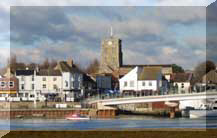
ELECTRONIC
NEWS
BULLETIN
FOR
THE
| News & Events |
| Wildlife Reports |
| Words of the Week |
| Historical Snippet |
| Advertisements |
If
you wish to receive this Bulletin, please ask by EMail, specifying the
Adur
Torpedo with your full name.
Glaucus@hotmail.com |
| Web Sites (Local) |
| Computer Tips |
| Games & Leisure |
| Web Sites (****) |
| Events |
| Adur "World
Oceans Day"
Photographs 2000 (follow any links) |
| LOCAL
ORGANISATIONS |
| LOCAL RESIDENTS PAGE |

This is the first published
Electronic Newspaper for
Shoreham-by-Sea and District,
West Sussex, England
7 June 2000 : Volume 2 Issue 20
Local News3 June 2000
The World Oceans Day Fayre at the start of the Adur Festival was well received. The success cannot be measured and quantified by a scientific method, but it seemed to have been appreciated.

Click on the image for the first photographs (on-line only).
Please send any comments to:
Andy Horton Glaucus@hotmail.com
Wildlife Reports
2 June
2000
Flocks
of Jackdaws arrive in the gardens to the north of Shoreham Town
centre in their scores (there are probably hundreds), scavenging in pairs
on the greens adjacent to roads. They have been absent or relatively few
in number for a decade at least.
On
Kingston
Beach the sea anemone Sagartiogeton undatus
was discovered. This uncommon sea anemone is present locally but rarely
discovered.
24
May 2000
First yearling Bass
spotted in the few remaining Old Fort rock pools These were confirmed on
24 May 2000, but these very small fish (to 50 mm) probably arrived earlier.
16
May 2000
Two
consecutive days start off misty with the new Power Station chimney completely
obscured from Shoreham and the fog horn sounding. Approaching the low springs,
(high at 5.6 m, low at 1.2 m), Blennies (a small
green fish) were exceptionally common at Kingston
Beach, below low water mark, commoner than for any time for 20 years.
They varied in length from 60-75 mm long. Apart from a few Common
Gobies, they were the only fish in the pools.
Shore
Crabs were plentiful as is usual in May, but what was surprising was
that almost 100% of them were coloured green.
1999
Report
Tides
page
British Naturalists' Association
Find
the Sites of Special Scientific Interest using this link:
Friends
of the Earth SSSI Navigator
Words of the Week
logical positivism, a set of doctrines espoused most famously by a group of philosophers calling themselves the Vienna Circle, who met in Vienna during the 1920s and 1930s. In the tradition of analytic philosophy and influenced strongly by empiricism and especially by Hume, logical positivism was an attempt to develop empiricist views with the help of logic and mathematics, in particular, in the work of Russell and the young Wittgenstein. According to logical positivists, sense experience is all we can appeal to in justifying our beliefs or in explaining the meaning of our words. These views give rise to the Verificationist Principle on which the meaning of a sentence is the procedure by which it can be verified. The logical positivists believed that adoption of their ideas would dissolve all the problems of philosophy because any question to which the answer could not be provided by some experience would be meaningless. Logical positivism was spread in the UK by Ayer's work and in the USA by the forced emigration of Carnap.
- existentialism
| ezsten()lz()m | n. M20. [tr. Da. existents-forhold (Kierkegaard)
condition of existence, f. prec. + -ISM.] A modern philosophical trend,
the leading tenet of which is that a person (unlike a thing) has no predetermined
essence but forms his or her essence by acts of pure will. Cf. ESSENTIALISM.existentialist
n. & a. (a)n. an advocate or adherent of existentialism; (b)adj. of,
pertaining to, or characteristic of existentialism: M20. existentialistic
a. L20.
-
Star:
Latest Virus Information
existentialism, a movement in mid-20th-century continental philosophy. In the post-war years it gripped the imagination of many thinkers, writers, and artists. Its appeal lay partly in its ability to reflect the alienation and experience of atrocity in 20th-century Europe. Existentialist philosophers speculated about the nature of reality, but subordinated traditional metaphysical and epistemological questions to an anthropocentric perspective, in which there takes place a dramatic, often tragic, confrontation between man and the world. Existentialist thought tends to disparage scientific knowledge, particularly psychology, in so far as it claims to be a science, and to insist on the absence of objective values, stressing instead the reality and significance of human freedom. Influenced by Kierkegaard, existentialism gave rise to a tradition of Christian existentialism, but the best-known exponents of existentialism in its atheistic form are Heidegger and Sartre. Existentialism cannot be easily identified with any single set of philosophical ideas. It took contemporary inspiration from Husserl's phenomenology, but derived also from various sources in 19th-century philosophy, including Nietzsche and Kierkegaard, whose conception of the 'individual' may be regarded as a prototype for the existentialist view of the human being as solitary, contingent, and self-creating.
semiotic | simtk, sem- | a. & n. Also semei-. E17. [Gk semeiotikos significance, f. semeioun interpret as a sign, f. semeion (see SEMIOLOGY): see -OTIC, -IC, -ICS.] A adj. 1 Med. Of or pertaining to symptomatology. E17. 2 Symbolic, serving to convey meaning. rare. Only in L18. 3 Of or pertaining to semiotics or the production of meanings by sign-systems. E20. B n. I In pl. (usu. treated as sing.). 1 Med. Symptomatology. L17. 2 The branch of knowledge that deals with the production of meanings by sign-systems in various fields, esp. in language or literature. L19. II sing. 3 = sense B.2 above. L19.semiotical a. = SEMIOTIC a. 1, 3 L16. semiotically adv. E20. semiotician n. a semioticist M20. semioticist n. an expert in or student of semiotics L20.
---------------------------------------------------------
Excerpted
from The Oxford Interactive Encyclopedia
Developed
by The Learning Company, Inc. Copyright (c) 1997 TLC Properties Inc.
Computer Tips
Sussex Web Sites
Historical Snippets
The origin of the "shore" component in Shoreham seems obvious to the general public, but it is dismissed outright by the linguists for the simple reason that the word was not known to be used by the Saxons (Old English) with its current meaning.
shore
| | n.1 ME. [MLG, MDu. schore, perh. f. base of SHEAR v.] 1
a The land bordering on the sea or a large lake or river; a coast, a bank;
(sing. & in pl.) a country bounded by a coast. ME. b Law &
Physical Geogr. Land lying between ordinary high and low water marks. E17.
2 Part of a seashore built up as a landing-place; a quay, a wharf.
---------------------------------------------------------
Excerpted
from The Oxford Interactive Encyclopedia
Developed
by The Learning Company, Inc. Copyright (c) 1997 TLC Properties Inc.
NB:The American Heritage Dictionary 3rd Edition gives the etymon for the word 'shore' as scora and this would be consistent with the past participle of scoren, shear, shorn.
Exactly when shore was first used in its current meeting is not known, but my guess is that it was before the 14th century.
Games & Leisure
Please send in any details
of recommended games and web sites.
SPONSORSHIP OPPORTUNITY
For any company or organisation wanting nationwide green publicity, there is an opportunity to sponsor the journal "Glaucus" of the British Marine Life Study Society.
There remains sponsorship opportunities on the BMLSS (England) web site and other publications, including Torpedo.
Sponsorship is also available for the Adur Torpedo Electronic News Bulletin and the Shoreham-by-Sea web pages (which preceded the Adur Resource Centre web site), which would be more suitable for a local firm(s).
Web Site Design Services are available from Hulkesmouth Publishing
Normal
advertisement rules apply.
Submissions
accepted by EMail only.
Adur Torpedo was written, designed and distributed by Andy Horton.
Links
to earlier issues (for subscribers who have downloaded the Bulletins only,
and web site visitors).



 ADUR
ARTS FESTIVAL
ADUR
ARTS FESTIVAL

